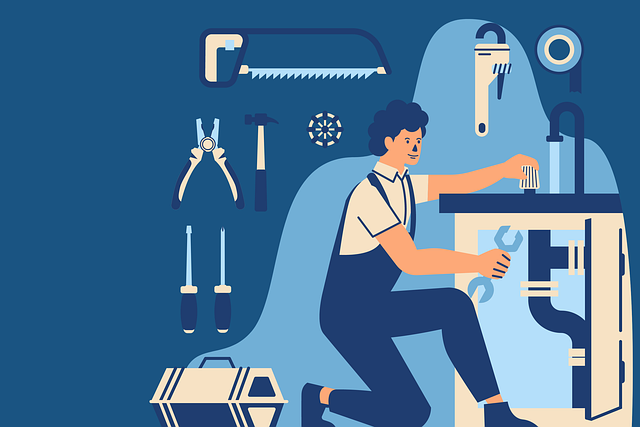When upgrading plumbing systems, homeowners have options between PEX (cross-linked polyethylene) and copper piping. PEX offers flexibility, freeze resistance, reduced scale buildup, easier installation, faster completion times, fewer fittings, eco-friendliness, and long-term cost savings. Copper excels in conductivity for hot/cold water, durability against chemical degradation, modern flexible technologies simplifying installation, and aesthetic appeal but requires more manual labor, structural support, and may have limited flexibility. Plumbers should weigh key factors like durability, cost, installation efficiency, and environmental impact to recommend the best option for specific needs.
Considering a plumbing upgrade? You might be wondering about the pros and cons of PEX versus copper piping. This guide breaks down the key factors for an informed decision. We’ll explore the durability, advantages, and drawbacks of each material, helping you choose the best option for your home. From cost-effectiveness to long-term reliability, understand how PEX or copper piping can impact your plumbing system, all while helping you make a smart choice with the assistance of a qualified plumber.
- Understanding PEX and Copper Piping: Materials and Durability
- Advantages of Upgrading to PEX Piping
- Pros and Cons of Choosing Copper Piping Over PEX
- Factors to Consider When Deciding Between PEX and Copper Upgrades
Understanding PEX and Copper Piping: Materials and Durability

When considering upgrades for your plumbing system, understanding the differences between PEX and copper piping is key. Both materials have their merits when it comes to durability and efficiency, but each offers unique benefits that a plumber can help you navigate. PEX (cross-linked polyethylene) piping is known for its flexibility, making it easier to install in tight spaces. It’s resistant to freezing, corrosion, and scale buildup, ensuring long-lasting performance without the need for frequent repairs or replacements.
On the other hand, copper piping has been a traditional choice for decades due to its excellent conductivity, making it efficient for both hot and cold water supply lines. Copper is highly durable and resistant to degradation from chemicals present in water. While more rigid than PEX, modern copper tubing technologies offer increased flexibility, easier installation, and reduced risk of leaks—all factors that contribute to a longer-lasting plumbing system, as recommended by professional plumbers.
Advantages of Upgrading to PEX Piping

Upgrading to PEX (Cross-Linked Polyethylene) piping offers numerous advantages over traditional copper piping, making it a preferred choice for many homeowners and plumbers. One of the key benefits is its exceptional durability. PEX pipes are resistant to corrosion, freezing, and bursting, which significantly reduces the risk of leaks and water damage. This longevity translates to cost savings in the long run, as you’ll avoid costly repairs or replacements.
Additionally, PEX piping is highly versatile, allowing for easy installation and routing through tight spaces. Plumbers can quickly and efficiently install these pipes, often with less time and labor compared to copper. This flexibility also means fewer fittings and joints, reducing potential leak points. Moreover, PEX is eco-friendly, as it is made from a durable, recycled material that can last for decades, contributing to a more sustainable home.
Pros and Cons of Choosing Copper Piping Over PEX

Copper piping has been a traditional choice in plumbing for decades, offering both aesthetic and functional appeal. One of its key advantages is durability; copper is highly resistant to corrosion and degradation, ensuring long-lasting performance. This makes it an excellent option for challenging environments or areas prone to extreme weather conditions. Additionally, copper’s natural ability to conduct heat efficiently makes it a top pick for hot water pipes, as it reduces heat loss and contributes to energy efficiency. It also has a proven track record of longevity, with many copper plumbing systems still functioning flawlessly after centuries.
However, there are some drawbacks to consider when opting for copper. Installation can be more labor-intensive and costly compared to PEX (cross-linked polyethylene) piping. Copper is heavier, which may require additional structural support during installation. Additionally, its flexibility is limited, making it less adaptable in tight spaces or complex layouts. On the other hand, PEX offers easier routing and bending capabilities, often reducing labor costs for plumbers. Lastly, while copper has its environmental benefits, PEX is known for its eco-friendliness due to its recycled content and lack of lead, making it a more sustainable choice.
Factors to Consider When Deciding Between PEX and Copper Upgrades

When deciding between PEX (Cross-linked Polyethylene) and copper piping upgrades, several factors come into play. A plumber can guide you through these considerations to ensure you make an informed choice based on your specific needs. First, durability is a key differentiator. PEX pipes are known for their resistance to corrosion, freezing, and bursting, making them less prone to leaks and damage over time. Copper, while durable, is more susceptible to corrosion inside walls and may require more frequent replacement.
Cost is another significant factor. Initially, copper piping might appear more expensive due to its higher material cost. However, PEX installations can be faster, reducing labor expenses. Additionally, PEX’s resistance to clogs and leaks can lead to long-term savings on repair costs, making it a worthwhile investment for many homeowners.
When deciding between PEX and copper piping upgrades, considering durability, maintenance, and cost is crucial. Plumbers often recommend PEX for its flexibility, freeze resistance, and long-term savings on repairs. However, copper remains a popular choice due to its superior heat conductivity and timeless aesthetic appeal. Ultimately, the best option depends on individual needs, climate, and budget. Consulting with a professional plumber can help ensure the longevity and efficiency of your plumbing system.
